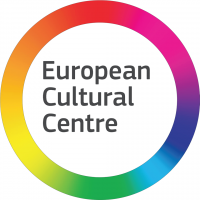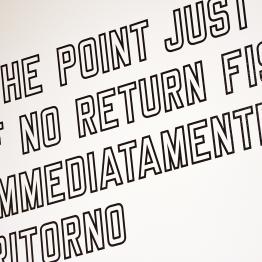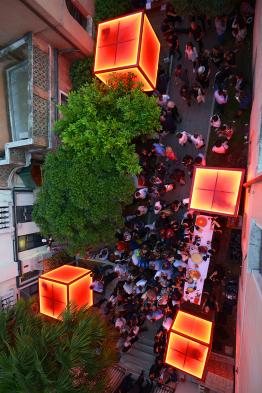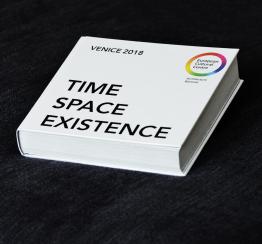GUIDELINES
European Cultural Centre Values and General Guidelines
Being aware of our social responsibility, we wish to establish a democratic, dynamic, creative, communication and interaction platform: creating spaces, a flexible worldwide network of cultural centres, dedicated to sharing sincere, intellectual and cultural exchanges, to further develop the fundamental goodness within human beings and adding a positive meaning to our existence.
The foundation of the European Cultural Centre lies in the realization that beauty and qualities are in our uniqueness as well as in our similarities. Being aware that globalisation cannot be stopped, our aim is to cherish our differences and at the same time strengthen our intellectual and cultural commons.
We believe in equality, a commitment to others, a sincere caring and that every individual person should try to better understand, tolerate, respect and appreciate other cultural values, as long as these cultural values respect the freedom, the dignity and rights of every single living being. It is a continuous learning process to reject values that should no longer serve us and to replace these values with newly adopted values.
We do like to make clear that we wish to avoid any form of discrimination. We do appreciate freedom of speech and the freedom to present any artistic expression to any topic for everybody. However, we will always strongly express our disapproval of abuse of power and our disapproval of provoking hatred and violence.
Horizontal relationships, an open, honest and as sincere as possible visual and verbal communication, education, as well as sharing our values as part of transparent human interactions in every aspect of life, should lead to a better quality and meaningful existence for each and all of us.
To achieve a sustainable Europe, a peaceful sustainable world, the intellectual, environmental, social and cultural objectives have to be rebalanced with integrity, against our financial and economic interests. Creative and critical thinking, fostered by the arts and all other cultural activities, also play an important role if people are to regain trust in Europe, gain trust in their own world.
Culture is a fundamental element for personal enrichment and development. We will bring together people from all parts of the world through cultural exchanges by creating worldwide projects, meetings, exhibitions, publications and all kinds of other cultural events.
We will enable and strengthen groups and individuals, to create cultural activities, to exchange ideas between Europeans and others and thus creating an increased awareness about our origins, about our uniqueness, our existence; embracing our cultural commons and differences.
The European Cultural Centre provides the conditions to invite artistic and creative practices, a process of learning and experiencing from all intellectual and cultural fields - visual arts, dance, performance, theatre, music, literature, architecture, etc.
Creating flexible spaces in motion which, besides exhibiting finalised projects, will go further and promote projects that strongly interact between the various creative practices and the countries, cities, the participants and visitors from all over the world. Places for investigating the most vital contemporary issues in order to have an influence upon the design of our shared future. Intellectual and cultural interactions providing us with additional information to further develop and redefine our values.
European Cultural Centre: Organisational Structure
The European Cultural Centre is a worldwide network of legal entities all acting with a non-profit objective but preferably financially self-sustainable. The headquarter, European Cultural Centre Worldwide, is based in the Netherlands as an association, the ECC-Satellites are spread all over the world. All official members of the ECC-Satellite network operate under a variation of the brand name European Cultural Centre, ECC, with an extension (country, region, city or activity).
The ECC-Worldwide has obtained an exclusive, indefinite license, for the use of certain brand names and logos, from the ECC-Global and is entitled to provide sub-licenses to existing and new, to be established, ECC-Satellites. The proper use of these brands and logos related to the European Cultural Centre is managed and overseen by the ECC-Worldwide.
The European Cultural Centre is continuously expanding its network of Satellites, contacts and partners. The global sharing of resources, knowledge and contacts has to result in an increased international interaction and the creation of joined projects, as well as enabling people to participate worldwide in cultural activities such as exhibitions, education, creative projects, exchange of ideas and knowledge.
In order to achieve our goals we continue to enlarge our international network of inspired, motivated, creative, idealistic and committed individuals, who care and who are determined to create and improve these independent ECC-Satellites where intellectual and cultural exchange is a reality.
In order to avoid centralism we support the creation of national satellites, flexible, adaptive and democratic organisations, which can decide independently how to realize the values and guidelines of the ECC.
European Cultural Centre - Global
The European Cultural Centre Global (ECC-Global) is a legal entity headed by Rene Rietmeyer, which holds all the rights for all brands and all logos related to the names European Cultural Centre, ECC, Venice Design, European Cultural Academy and ECA. In addition the ECC-Global acts as a consultant for everybody related to the ECC, who does requests its advice or support.
In return for granting licence rights, develop ideas, initiate activities and giving advice, the ECC-Global receives an annual licence and consultancy fee from the ECC-Worldwide.
European Cultural Centre - Worldwide
The European Cultural Centre Worldwide, ECC-Worldwide, is a non-profit association based in the Netherlands. Its main objective is to further enlarge the ECC-Satellite network by supporting the creation and further development of European Cultural Centre Satellites by providing know-how and, in case needed, financial support.
The ECC-Worldwide obtained the exclusive rights to use and sub-license all of the European Cultural Centre related brand names and logos from the ECC-Global. The ECC-Worldwide acts as “mother” of all ECC-Satellites.
The ECC–Worldwide can sub-license the brands and logos to legal entities, preferably non-profit associations wishing to operate as an ECC-Satellite. The ECC-Worldwide can decide upon its own discretion which legal entity is allowed to operate as an ECC-Satellite under the name ECC-CountryName etc..
The main role of the ECC–Worldwide is to continue the worldwide numerical expansion and quality improvement of the ECC-Satellite network and to support each ECC-Satellite to become a financially self sustainable organisation by providing guidance and know-how to each Satellite, such as Graphics, PR, communication and online support as well as start-up funding if needed. Upon request and for a fee, the ECC-Worldwide can provide several additional services, such as: administrative support, invoicing, payments, VAT-declarations, financial planning, budgeting, contracting etc.
The board of directors of ECC-Worldwide contains 5 board members. In addition there is a minimum of five additional members who act as an advisory board. Members of this advisory board are preferably also active in one or more of the ECC-Satellites.
Every five years, elections are held amongst all ECC-Worldwide association members in order to decide who will serve on the board of directors. This voting may lead to the replacing of a maximum of 40% of the board of directors by other association members, who are a member for at least two years.
The ECC–Worldwide has a Board of Statutory Auditors. The BSA main role is to monitor the Board’s administrative functioning, this includes: annual budget and annual financial report.
The members of the BSA operate independently from the ECC network and members who appointed them. The BSA should arrange regular meetings, at least once a year, about the development of the supervisory functions, which include: respect for the rules of the general administration and respect of internal control system. The BSA is responsible for the analytic information, internal audit and the transmission of its relevant reports concerning the activities of the ECC-Worldwide.
European Cultural Centre - Satellites
The board of a new-to-be established ECC-Satellite consists of members who are appointed by the ECC-Worldwide board of directors.
The ECC-Satellites will be geographically organized by region, country or city and should be named according to the main region where it is active in, but their name could also include an activity, such as education, collection, film or philosophy.
The goal of all ECC-Satellites is to promote cultural activities in the name of the ECC. The ECC-Satellites have the responsibility to act according the guidelines and values of the European Cultural Centre. All ECC-Satellites are in principle equal, and will be treated as such.
The name under which the ECC-Satellite will operate, ECC-Name, is the name under which a non-profit association, foundation or company will operate as an ECC-Satellite. The ECC-Name is not necessarily the name of the legal entity itself.
An ECC-Satellite is preferably an independent registered association, this to answer best to the principles of democratic ownership, as well as organizational and financial correctness in the sense of the ECC values and guidelines.
For specific reasons, a satellite may be a legal entity other than a registered association. An ECC-Satellite cannot be owned and operated by one single person. The main part of the financial gains of an ECC-Satellite will be in most cases the selling of services, therefore, an ECC-Satellite should, when possible, register a VAT number.
In general, it is possible for an association to pay its board members and other members a fee for the services they provide. However, this has to be organized in a transparent manner. It is not possible to share the ECC-Satellite’s profits amongst members and/or board members.
Payments to ECC-Satellite board members have to be proportionally acceptable in regards to the delivered services. In any case, the ECC-Worldwide acts as a supervisory board in regards to the transparency and proportionality of payments made.
The main goals of the ECC-Satellites are to be conform the general goals of the ECC-Worldwide itself, as described in the ECC-guidelines. Members of an ECC-Satellite are eligible to be invited to be on the ECC-Worldwide advisory board.











